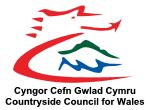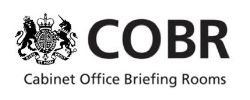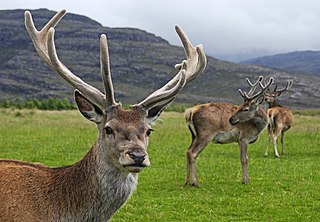The UK Co-ordinating Body is an executive unit of the Government of the United Kingdom that assists other national and regional government bodies in implementing the European Union's Common Agricultural Policy.
In the United Kingdom, non-departmental public body (NDPB) is a classification applied by the Cabinet Office, Treasury, the Scottish Government and the Northern Ireland Executive to public sector organisations that have a role in the process of national government but are not part of a government department. NDPBs carry out their work largely independently from ministers and are accountable to the public through the Parliament; however, ministers are responsible for the independence, effectiveness and efficiency of non-departmental public bodies in their portfolio.

The Countryside Council for Wales was a Welsh Assembly sponsored body responsible for wildlife conservation, landscape and countryside access authority for Wales. It was merged with Forestry Commission Wales, and Environment Agency Wales to form Natural Resources Wales, a single body managing Wales' environment and natural resources, on 1 April 2013.

The Cabinet Office Briefing Rooms (COBR) are meeting rooms in the Cabinet Office in London. These rooms are used for committees which co-ordinate the actions of government bodies in response to national or regional crises, or during overseas events with major implications for the UK. It is popularly referred to as COBRA.

The Cabinet of the United Kingdom is the senior decision making body of the Government of the United Kingdom. A committee of the Privy Council, it is chaired by the prime minister and its members include secretaries of state and other senior ministers.
RenewableUK, formerly known as the British Wind Energy Association (BWEA), is the trade association for wind power, wave power and tidal power industries in the United Kingdom. RenewableUK has over 660 corporate members, from wind, wave and tidal stream power generation and associated industries.
The North/South Ministerial Council (NSMC) is a body established under the Good Friday Agreement to co-ordinate activity and exercise certain governmental powers across the whole island of Ireland.
Duncan McNeil is a Scottish Labour Party politician. He was the Member of the Scottish Parliament (MSP) for the Greenock and Inverclyde constituency from 1999 until 2016.

The Local Government Association (LGA) is the national membership body for local authorities. Its core membership is made up of 339 English councils and the 22 Welsh councils through the Welsh Local Government Association.

National Historic Ships UK is a government-funded independent organisation that advises UK governments and others on matters relating to historic ships. It is sponsored by the Headley Trust, the National Lottery Heritage Fund and the Department for Digital, Culture, Media and Sport.
Digital UK is a British television communications company owned by the BBC (1922), ITV (1955), Channel 4 (1982) and Channel 5 (1997) which supports Freeview viewers and channels. It provides people with information about their options for receiving terrestrial TV and advice on reception and equipment. The company also handles day-to-day technical management of the Freeview Electronic Programme Guide (EPG), allocates channel numbers and manages the launch of new services and multiplexes onto the platform. Digital UK has been licensed by Ofcom as an EPG provider.

The Wales TUC is the co-ordinating body of trade unions in Wales. With 48 affiliated unions as of 2021, the Wales TUC represents nearly 400,000 workers.

Mountain rescue services in England and Wales operate under the association of Mountain Rescue England and Wales (MREW), formerly called Mountain Rescue Council of England & Wales. The association has a number of regional mountain rescue teams, each of which is an independent charity. The team members are highly trained volunteers who are called out by the police.

Jeffrey Hambley Cuthbert is a Welsh politician serving as Gwent Police and Crime Commissioner since 2016. Cuthbert served as a Labour Party member of the National Assembly for Wales for Caerphilly from 2003 to 2016. He began his career in the mining industry and later worked for the Welsh Joint Education Committee as Head of the Asset to Industry Unit.

The Manpower Services Commission (MSC) was a non-departmental public body of the Department of Employment Group in the United Kingdom created by Edward Heath's Conservative Government in 1973. The MSC had a remit to co-ordinate employment and training services in the UK through a ten-member commission drawn from industry, trade unions, local authorities and education interests. This was an example of the contemporary corporatist influence on British economic policy.
Lucilita Bhreatnach is an Irish republican politician and member of Sinn Féin.

International Territorial Level (ITL) is a geocode standard for referencing the subdivisions of the United Kingdom for statistical purposes, used by the Office for National Statistics (ONS). Between 2003 and 2021, as part of the European Union and European Statistical System, the geocode standard used for the United Kingdom were Nomenclature of Territorial Units for Statistics or NUTS. The NUTS code for the UK was UK and the NUTS standard had hierarchy of three levels, with 12 first level regions, which are currently mirrored by the ITL classification, of which 9 regions are in England. The sub-structure corresponds to administrative divisions within the country. Formerly, the further NUTS divisions IV and V existed; these have now been replaced by Local Administrative Units . Between 1994 and 2011, the nine regions had an administrative role in the implementation of UK Government policy, and as the areas covered by elected bodies.
The area gas boards were created under the provisions of the Gas Act 1948 enacted by Clement Attlee's post-war Labour government. The Act nationalised the British gas industry and also created the Gas Council.
Area health authorities were 90 bodies responsible for administering the National Health Service, established in England by the National Health Service Reorganisation Act 1973 in 1974. Each covered a geographical population which matched a Local Government territory. They co-ordinated primary care services and services requiring collaboration with local government. They were abolished in 1982 and their responsibilities transferred to the smaller district health authorities.

Scottish Forestry is the public body responsible for forestry regulation, policy and support to private landowners in Scotland. It was formed on 1 April 2019, to take over some of the responsibilities of Forestry Commission Scotland, which was dissolved. Scottish Forestry exists alongside Forestry and Land Scotland, also established on 1 April 2019, which is responsible for managing and promoting the National Forest Estate.

This article gives an overview of the structure of environmental and cultural conservation in Scotland, a constituent country of the United Kingdom.